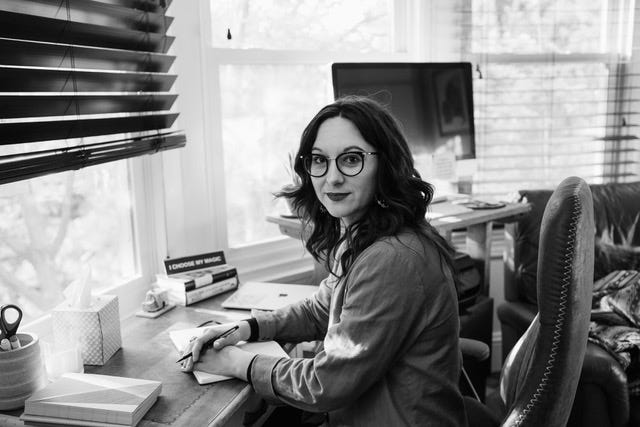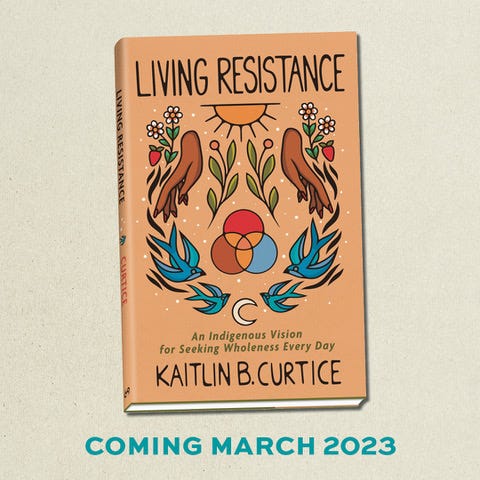Kaitlin Curtice teaches rest and resistance.
GUEST WRITER: A beautiful discussion of poetry with author Kaitlin Curtice.
Hi all. I’m thrilled to introduce you to my first-ever guest writer!
For those of you who don’t already know Kaitlin Curtice, she is a brilliant wordsmith, a fount of wisdom and compassion, and one of my favorite teachers on the internet. She recently sent me a poem she wrote, and I have been so looking forward to sharing it with you. I won’t blather on about it—you can read it yourself, as well as my interview with her about it below. If you like what you read (I know you will), you can preorder her new book here. Enjoy!
A Letter to You, Darling
Darling—
Who told you that you are a tool to be used,
A prize to be won,
An item to be ticked off the list?
Who told you that your complexity
Is a cop out
And not your greatest gift?
Who told you, in one simple sentence,
That your voice is both the most important
And doesn’t matter at all?
Who told you that healing is impossible?
Who forced you to believe that
Rest is for lazy suckers
And work is the end goal?
Who told you that God is on the side
Of the powerful, so keep your mouth shut?
Who told you that you couldn’t be human?
Darling,
Do something for me?
Search the skies,
The oceans,
The lakes and rivers,
The flowerbeds
And bears’ dens,
The hummingbird’s buzz,
The quiet morning light
And the cover of shade,
And demand something
Of yourself, of this life,
Of them—
Demand a simple proclamation
That will ripple
Into the universe—
That you are not a tool,
A prize,
An item.
You are complex,
You are trying,
Your gifts matter,
Your voice isn’t the most important
And it’s not the least,
But will be used just as it should.
Your healing is possible,
Rest is for everyone and everything,
And work is only a sliver of this life.
Say it out loud,
That God notices every little thing
And we are simply here
To notice, too.
Demand that every experience be
Infused with fierce love.
And next time you see them,
Darling,
Next time they want to tell you
What it means to be alive,
Think of those rivers and that morning sunlight,
And the freedom of that hummingbird,
And tell them to fuck all the way off,
Because resistance is in
The kinship of this moment,
Where it’s always been,
Where it waits for us to journey forward.
Q&A with Kaitlin Curtice
Q: I love that right from the outset, this poem reads almost as a letter. When you were writing this, who did that Darling represent to you?
I was really drawn to that word for this poem, and I’m not often drawn to that word. I needed something that was deeply endearing and intimate, hoping that whoever reads it, they know these words are for them, exactly for them, for their care and flourishing. Darling just seemed to be the only word that fit for this one!
Q: I had such a visceral response to this poem when I read it the first time (and second, and third). I think this maybe has to do with how much of a physical experience it is being a person on the internet—the anxiety, the tightness in my chest, the borderline nausea, the tension in my jaw. Your poem seems to come in and put gentle hands on those places, one by one, stanza by stanza, offering an alternative way to exist in our bodies in these times. What part of you did this poem come from, and what were you seeking to ease when you wrote it?
This summer, I took an extended break from posting on social media. The first thing I noticed when the apps were deleted from my phone was that I had energy to do a deep clean of my home. I’d downloaded a Pinterest printable of a week of cleaning room-by-room, and I did it with my two kids—an hour per room each day. By the end of then week, our house felt so much more organized and cared for, and I realized that I’d let social media (and the opinions on it) take up too much mental space in my head, and too much space in my body and spirit. There has to be a balance, and that’s what I’m still trying to figure out as someone who really needs social media for my career. How can I make the space safer, healthier, as someone who struggles with anxiety? I’m not sure what the answer is, but I return to that moment when I noticed how beautiful and safe my home felt. That will keep me asking questions and writing poems like this one.
Q: The line, “Who told you that your complexity / Is a cop out / And not your greatest gift?” I felt deep in my chest. For me, it evoked that fear I’ve experienced in online spaces, that to hold space for nuance or to see things from different angles than the loudest voices around me is a betrayal of my values, a lack of commitment to the causes I am devoted to. Is this what you intended to be read from that, or does it mean something else to you?
Absolutely, that’s what I hoped the sentiment would be. We don’t like nuance! We cannot be complex people living in a complex time! Everything is dualistic! How dare you imagine transformation! Complexity is terrifying. But it is our greatest gift. I am always reminded of this when I think about the show Criminal Minds. Yes, terrifying show about serial killers! Also somehow a show about how we see each other’s humanity and the complexity of trauma and grief! It reminds me that nuance has to exist for us to keep going. This poem is about celebrating our complexity and not acting like it doesn’t exist.
Q: It’s such a multi-sensory experience, the stanza that begins, “Search the skies”—even the way it feels to read aloud, “The hummingbird’s buzz.” Here are all these quiet things going about their lives, doing the things they simply must do. It then takes a sudden pivot: “And demand something.” This more passive call to observation suddenly an exhortation to act. What should be read in the space between those lines that at a glance seem so at odds in their tone and expectations?
Some of my best writing, my most pivotal spiritual moments, happen when I stop and pay attention to Mother Earth and the creatures around me. It both opens up my childlike curiosity again and allows me to dig deep. What happens when we do that? What should happen when we practice presence or mindfulness like that? It should seep out of us! Presence should lead way to some sort of beautiful, radical resistance, a demand for a better world for ourselves and each other!
Q: “Rest is for everyone and everything, / And work is only a sliver of this life.” What is this meaning to you these days? Does it mean the same thing to you today as it did when you wrote it?
It may mean more to me now. I’d gotten to a point in my life at the end of 2021 where I’d realized if I didn’t shift the stressors in my life around, I was going to end up in the hospital. I needed a radical shift in my daily rhythms, including what I was eating, how I was moving and finding embodiment, and what I was allowing into my mind and heart. Making these changes has saved my life in so many ways. As a writer, I’m kind of always mentally “on” and that can be absolutely fucking exhausting! So I have to stop and get that moving energy out of my body. I have to remember that work is just a sliver, and the actual magic is somehow in the enjoyment, the rest, the stepping away. Such a hard lesson to learn, but we all need to learn it—together.
Q: I don’t even know what to say about these last two stanzas. They read like rich soil—such a nutritious, life-giving substance made of too many individual components to named, so we just call it “soil.” Here are some of the many thoughts and questions that come to mind: What do you think is important about the idea of Divine Attention, and what is the link you see between this idea of a noticing God and the impetus for us as people to pay closer attention to the world? Is this a theological idea to you, or something else? How should this change us? There again is that contrast between being simply here to notice, and a charge to make demands—what does it look like practically to demand from a very harsh world an infusion of fierce love? What does kinship mean to you here? What does it mean to have kinship with a moment, and how do you envision that kinship leading us onward?
I love these questions so much! I have started identifying myself as someone who is fierce yet gentle. It’s just who I am, I can’t help it. I want to tell the truth in a fierce way, and I want to be gentle with my own stories and with the stories of others. That is how I operate, it’s how I write, and I think this poem reflects that. At the end, I needed to say something harsh, something maybe difficult to hear, that we have permission to say no to those outside expectations, and embrace who or whatever “God” might be in our lives, the magical, the mystical, the good and sacred. Kinship is living in reciprocal, loving relationship with the world around us. Resistance is pushing against the status quo of hate around us. That’s what the journey of being human is. What an honor. What a terror. I’m so glad we have poetry to guide us.
Kaitlin Curtice is an award-winning author, poet-storyteller, and public speaker. As an enrolled citizen of the Potawatomi nation, Kaitlin writes on the intersections of spirituality and identity and how that shifts throughout our lives. She also speaks on these topics to diverse audiences who are interested in truth-telling and healing.
As an inter-spiritual advocate, Kaitlin participates in conversations on topics such as colonialism in faith communities, and she has spoken at many conferences on the importance of inter-faith relationships.
Besides her books, Kaitlin has written online for Sojourners, Religion News Service, Apartment Therapy, On Being, SELF Magazine, and more. Her work has been featured on CBS and in USA Today. She also writes at The Liminality Journal. Kaitlin lives in Philadelphia with her family.
Preorder Kaitlin’s new book, Living Resistance, coming March 2023.





